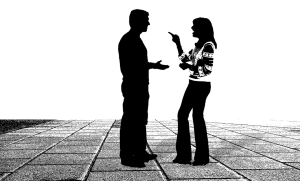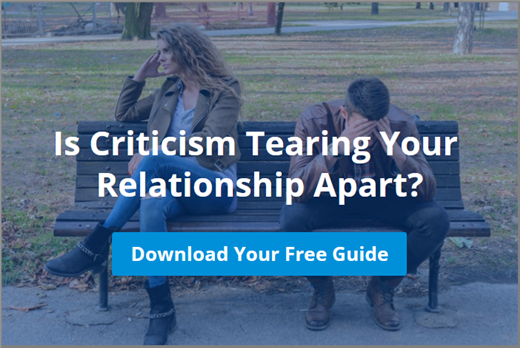
Being Too Critical In A Relationship
Criticism in relationship is a behavior that can be toxic to the couple. It erodes away positive feelings over time and leads to other problematic behaviors that can destroy the connection. My intention for this article is to help you understand when criticism in relationship is too much to handle.
 While constant criticism in relationship can easily occur, it also is a major predictor of divorce according to John Gottman, a major couples researcher. It is very tough to be around someone who is constantly remarking about your flaws and blaming you for your shortcomings. Over time, being too critical in relationship will whittle away at the health and joyful parts of the connection.
While constant criticism in relationship can easily occur, it also is a major predictor of divorce according to John Gottman, a major couples researcher. It is very tough to be around someone who is constantly remarking about your flaws and blaming you for your shortcomings. Over time, being too critical in relationship will whittle away at the health and joyful parts of the connection.
Criticism in relationship occurs when we focus on our partner’s flaws and pass judgment. It is expressed through disapproving, critiquing, correcting, blaming, nitpicking, or fixing.
Constant criticism is not constructive, encouraging, or inspiring. The act of being critical focuses on the negative aspects and does not offer useful information for solutions and improvement. Criticism attacks someone’s character rather than addresses specific behaviors (i.e. “You are selfish. Rather than, “I would love your help with planning our upcoming trip”).
A critical attack focuses only on one aspect of the person or situation. It is natural to want to point out all the areas that do not fit into the critical statement. It is normal to feel defensive, and want to defend against the critical attack. Most people don’t know how to take criticism in a relationship because it is draining, adversarial, and depleting.

10 Signs That You Might Be Too Critical In A Relationship
Most people who are being too critical in a relationship are not even aware of it. Here are some indicators to help alert you to the fact that you may be more critical than you think:

© Stuart Richards | Flickr
1. You are very critical of yourself when you make a mistake (i.e. what do you automatically tell yourself when you make a mistake?). If you are highly critical with yourself, then you are probably highly critical of others.
2. Your parents were highly critical and/or had high expectations.
3. You tend to be a perfectionist.
4. You tend to offer editorial commentary on others appearance, home, and choices.
5. Your loved ones tell you that you are critical.
6. You are easily offended and insulted.
7. It is easier to find fault than praise. You will find the flaw rather than the positive.
8. Even if your partner does 90% of a task, you focus on the 10% that is incomplete. You get preoccupied with how your partner didn’t complete the task to your liking, and you forget to focus on the value of your partner’s effort and help.

© Gareth Williams | Flickr
9. You micromanage. You have a hard time letting go. If your partner didn’t complete a task in your preferred way, you will go afterward and fix it to your liking.
10. You tend to view others mannerisms and behavior as negative. As Steven Stosny jokes in his article about criticism, people will say “I give feedback; you’re critical. I’m firm; you’re stubborn. I’m flexible; you’re wishy-washy. I’m in touch with my feelings; you’re hysterical!”
Only when we feel comfortable with our own choices — and embrace our own imperfections — We will stop feeling the driving need to criticize others. ~ Brene Brown
16 Reasons Why You Might Be Too Critical In A Relationship
1. You have to be in control.
2. Things need to be your way. You are used to getting what you want. You are attached to your preferences and things being a certain way.
3. You think your way is the right or correct way. Being critical of others validates your thinking, position, and perspective.
4. You think if you can manage the world around you, anxiety and vulnerability will go away. It is hard to look inward at your own internal discomfort (i.e. feeling anxious or not good enough).
 5. Being critical of others helps you feel in power and dominant by focusing on others weaknesses or shortcomings.
5. Being critical of others helps you feel in power and dominant by focusing on others weaknesses or shortcomings.
6. You grew up in a critical environment and you learned that this is how things are supposed to be.
7. Criticizing has become a bad habit. You don’t know how to relate and get attention any other way. It is the way you have connected with others…talking about others, comparing, complaining, criticizing.
8. You doubt your value and worth. It is easier to try to defend against the vulnerable feelings by criticizing others rather than dealing with your own feelings of inadequacy and self-esteem. You criticize others before they have a chance to criticize you.
9. Your criticism of others is a reflection of what you do to yourself. Your internal voice and dialogue is highly critical.
10. Being critical of others keeps people from getting too close. You feel more protected and less vulnerable.
11. Criticism distracts you and helps you avoid how you really feel. If you are scared or stressed about something, it can be easier to criticize others rather than look at your own feelings, imperfections, and shortcomings.
12. You want to feel better about areas in your life where you don’t feel good enough so you compare yourself to others so you can be seen as more favorable.
13. You worry about what people will think of you and you try to protect your self-image. You think your external surroundings reflect on your identity and how others will view you.
 14. You feel overly responsible for others. You think you are trying to help and you think your feedback is necessary to help guide or facilitate their growth.
14. You feel overly responsible for others. You think you are trying to help and you think your feedback is necessary to help guide or facilitate their growth.
15. You feel strongly about an issue, but you do not know how to communicate directly with someone. It is difficult to speak up and advocate for your preferences. Instead, the issue keeps bothering and pestering you. You seem to get more annoyed and critical as the issue festers.
16. You are harboring hurt feelings and resentment about something. You do not feel confident about resolving an issue with your partner. You feel irritated and critical with your partner because you cannot clear the hurt.
The information provided in this list is direct but for reference. If you find yourself having a reaction after reading through the list, please take a deep breath and relax. If you feel blamed or judged, please let that go. I recommend reading a follow-up article to this one called 17 Ways To Shift Criticism To Maintain A Healthy Relationship. The article discusses how criticism in relationship can be managed in a more positive and constructive way.
Are you interested in getting support for being too critical in relationship? If so, contact me here. Let’s have a conversation to see how I might be able to help. No obligations. The consultation is free of charge.
I would also love to hear your thoughts on the signs of being too critical in relationship. Please leave me a comment below.
Thank you for taking the time to improve the quality of your life and relationships.
Thank you. ❤


